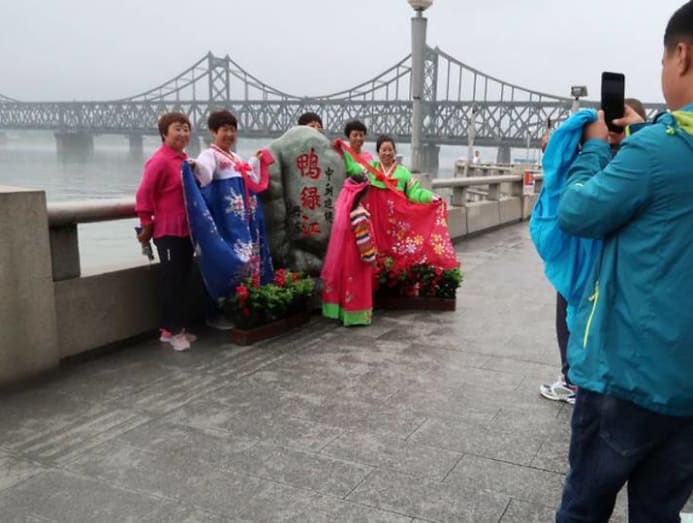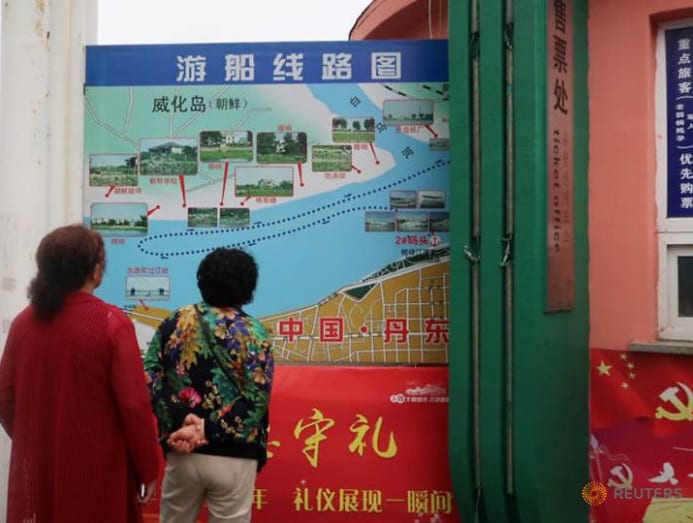Commentary: Is China using tourists to extend its overseas influence?
TOKYO: Decades of astonishing economic growth take given China new tools for extending its influence abroad and achieving its political goals.
Some of these tools are inducements, including Belt and Road Initiative projects and new development fiscal institutions.
But Cathay has demonstrated that information technology volition employ its new economic leverage in pursuit of political goals unrelated to economical exchange, swiftly shifting inducements to punishments.
One example lies in the field of tourism.
A GROWING POOL OF TRAVELLERS
Two factors brand regulating tourist flows tempting for Chinese policymakers: The size of its international tourism manufacture and the control China can still practice over outward tourism.
But whether tourism has been an constructive political tool is debated.
China has rapidly become the largest international tourist sender land in the world. Over the last ii decades, the number of Chinese overseas travellers rose by over 25 times from 5.3 million in 1997 to 130 one thousand thousand in 2017.
In the latter year, Chinese tourists contributed an estimated United states$250 billion to overseas economies, double the figure for US tourists and triple that of Federal republic of germany.
The Chinese government has a caste of leverage over its tourists that other governments do not enjoy. Many Chinese tourists are new to international tourism and have express international language abilities.
READ: Commentary: Why tourism can be a flashpoint for disputes

At that place is still a strong desire for comfort-zone or group tourism — approximately 38 per cent of outbound Chinese tourists are on group tours. Prc too has licensing and other forms of formal and informal leverage over tour group operators.
A RUDIMENTARY LEVER
The most rudimentary Chinese lever for rewarding other governments with increased Chinese tourist numbers is to grant countries Approved Destination Status. This allows group tourism to that country and tin increase the number of Chinese tourists past an average of 50 per cent.
Since the Chinese authorities has stronger regulatory power over bout agencies than most governments, it tin can also seek to influence foreign behaviour by curtailing such tours.
READ: Commentary: Passion Made Possible, a tagline that targets Chinese tourists
China's three largest licensed tourist agencies by acquirement are all state-owned and only eight per cent of its 25,000 licensed travel agencies are authorised to offer international travel. Strange agencies are not permitted to provide outward spring travel services for Chinese nationals.
Strange countries struggle to retaliate. Often, at that place are far more Chinese tourists going to their country than the other way around, a significant change in recent years.

China's large number of outbound tourists and strong regulatory power make tourism seem similar an ideal political tool.
Turkey became the commencement victim of China'due south use of tourist sanctions in 2000 when it refused to permit a Soviet-built Ukrainian ship that China had purchased to be the footing of its first aircraft carrier to laissez passer through the Bosphorus. China restricted outbound tourists to the country, pressuring Turkey to relent..
LIMITED SUCCESSES
Merely the utilisation of tourism for geopolitical goals has had varying levels of success. In 2022 to 2022 during a flow of increased tensions over the Senkaku/Diaoyu Islands, China attempted to manipulate tourist flows to influence Japan's behaviour.
Despite tourism dropping past 24 per cent, there was no noticeable impact on Japanese policy.
Similarly, in 2022 China's response to the deployment of the THAAD missile defense force system in South korea resulted in cutting Chinese tourist numbers from over 7 one thousand thousand in 2022 to 3 million in 2017.
But this did not stop the South Korean government from deploying THAAD.
READ: Commentary: Wouldn't information technology be nice to accept more public holidays?
The manipulation of tourism can cut two ways. The impact away tin acrimony citizens of foreign countries and their tourist industries as a whole, including those who are positively disposed to Beijing.
In Nihon and Republic of korea, it certainly soured public and governmental attitudes towards China. It may also be welcomed by some citizens who chafe at the large number of Chinese tourists coming to their countries.

HARMFUL TO China'S TOURISM INDUSTRY
Tourist sanctions can besides be harmful to Mainland china'south tourist industry. Sudden changes to travel plans for reasons people do non sympathize or appreciate nowadays difficulties in squaring such government controls with emerging heart-class attitudes.
At that place is a trend of increasing solo travelling, particularly among Chinese millennials. This will only increment as people become more accustomed to travelling away.
It will become increasingly more difficult for China to pressure and constrain international tourist flows.
Chinese tourist numbers will exist affected by fluctuations in the Chinese economic system, the ease or lack of ease when it comes to taking funds out of China and Chinese perceptions of whether or not tourists are field of study to harassment while travelling to certain countries.
It seems though that outright authorities meddling in pursuit of political goals may turn down if it is seen as counterproductive to political goals or domestically unpopular.
Anu Anwar is a Research Fellow at the Asia-Pacific Heart for Security Studies (APCSS), Hawaii. He is also an Affiliate Scholar at the East-Due west Center and a Visiting Scholar at the Institute for Avant-garde Studies on Asia, the University of Tokyo. This commentary first appeared on East asia Forum.
Source: https://cnalifestyle.channelnewsasia.com/commentary/commentary-china-using-tourists-extend-its-overseas-influence-300356
0 Response to "Commentary: Is China using tourists to extend its overseas influence?"
Postar um comentário